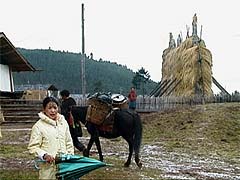
November 29, 2001
Kumming, China: Working with the Center for Biodiversity and Indigenous Knowledge
By Maja Tillmann Salas
|
|
Since September 2001, I am in Kunming, the capital city of the Yunnan Province in Southwest of China, cooperating with the Center for Biodiversity and Indigenous Knowledge (CBIK). My task here is to train people to make videos and to use other visual skills to broaden the knowledge of the uses of plants by different ethnic minorities in the region and to research and prepare material for the HORIZON Solutions Site.
What CBIK is trying to achieve is preservation of plant species and traditional practices, to preserve the multifaceted knowledge of environmental systems existing in this part of the world, each one of which contains unique and valuable solutions for the continuity of life.
|
|
I learned about one promising initiative when I went with CBIK representatives to the 1000 Lakes area - 'Jamanjiau Zuo'- in the Northwest of Yunnan, in the mountains of Tibet. This area is beautiful and it contains sacred forests and sacred mountains. Some time ago a Chinese Bank wanted to create a recreation park. In order to do so they wanted to take over a 45 km² area and cluster this natural area with many buildings and roads.
|
|
The Jisha community for whom this area has been the homeland for many generations organised an opposition to this tourist enterprise. The Jisha's biggest concern was that masses of tourists could offend the God's by trying to climb the sacred mountain and that they would contaminate the lake waters. The God's would then, according to their beliefs, punish the villagers of Jisha with unforeseen weather changes, forest fires or social calamities. The community has decided to take into their own hands to set a code for visitors within the principles of what they call "Eco Cultural Tourism".
They want visitors to learn about Tibetan culture but also they want to learn about their visitor's cultures in the spirit of a mutual learning experience. CBIK will support the community of Jisha in this intercultural process. The CBIK will help to build a visitors' home designed in Tibetan architectural style to receive visitors.
Maja Tillmann Salas is a HORIZON Intern
(c) HORIZON INTERNATIONAL 2001


